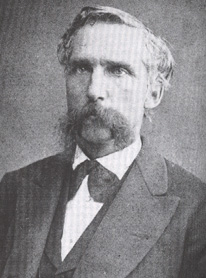 |
| *** Governor of Maine *** |
| Gen. Joshua Lawrence Chamberlain: A Dedicated Hero Home You are listening to the State of Maine Song. |
 |
| Governor J. L. Chamberlain |
| "Called to solve the problems entailed by the Civil War, his administration as Governor was marked by patience and fairness; he refused to use the power that people gave him for ends other than the people's good." --William DeWitt Hyde (Deans 81) |
| Joshua Chamberlain ran as a Republican candidate for governor in the Maine election of 1866. The people "saw Chamberlain as as a war hero and intellectual whose integrity could be trusted to help lead their state through its difficult times" (Deans 83). He was elected by "the largest majority ever polled by a gubernatorial candidate up to that time" (Deans 83). Chamberlain served as governor for four consecutive one-year terms. As governor, he paid particular attention to the war veterans, as well as the other victims of the Civil War, widows and orphans. He also worked diligently to boost industry in Maine, as a way to secure employment and revamp the economy. However, his four years as governor did not go off without a hitch. Chamberlain held some opinions that remdered him unpopular with a number of people, including those within his own party. For instance, Chamberlain did not have Republican support when he decided to take a stand and support Maine Senator William Pitt Fessenden in his opposition of the impeachment of President Andrew Johnson. Chamberlain also garnered criticism for his opposition to the Maine Constabulary Law, which gave "'petty officers the right to enter and search private premises on suspicion' that those living there may have liquor in their possession" (Deans 86). He felt that this law gave those officers entering homes an opportunity to take advantage of their authority, and that it infringed upon the constitutional rights of citizens. During his administration, the Constabulary Law was repealed. Another issue that plagued Chamberlain while he was in office was capital punishment. He believed in it, and disagreed with his predecessors' practice of choosing not to issue death warrants and set dates for executions. He was strongly opposed in his decision to sign the death warrant of convict Clifton Harris (though his reasons for doing so were valid). The four years as governor also presented Chamberlain with personal problems. His wife, Fanny, refused to move to Augusta, so he was once again separated from his family. This, in addition to the aftereffects of the war, took a toll on their marriage. However, because of mutual dedication to their commitment, the two were able to overcome their difficulties, and they remained married for nearly fifty years. |